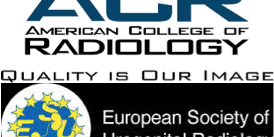Scientific Cooperation Aims to Accelerate Transfer of High Quality Prostate MRI from Laboratories to Clinics
December 1, 2014, Chicago, IL– The Joint Steering Committee of the American College of Radiology (ACR), AdMeTech Foundation and the European Society of Urogenital Radiology (ESUR) today released new clinical imaging guidelines to assist early detection and treatment of prostate cancer. The new guidelines were announced at the meeting of AdMeTech’s International Prostate MRI Working Group (AdMeTech’s Group) held in conjunction with the Annual Meeting of the Radiologic Society of North America (RSNA).
The Joint Steering Committee developed Prostate Imaging Reporting and Data System Version 2 (PI-RADSv2) as global guidelines for high quality multi-parametric prostate MRI service. This work has built on the initial PI-RADS standardization, which was recommended by AdMeTech’s Group in 2010 and created by ESUR in 2011. PI-RADSv2 has defined minimum technical requirements for creating images and in coordination with RSNA’s Radiologic Lexicon Committee, set standards for communicating the risk and location of aggressive prostate cancer. These clinical guidelines were established in order to expedite wide-scale transfer of the high quality clinical service from the few leading research centers to the international medical community.
Modeled after similar efforts in mammography that transformed breast cancer care, AdMeTech’s Group has brought together global experts in medicine and industry who have been working in cooperation to expedite the advancement, testing, standardization and implementation of prostate MRI since 2007. PI-RADSv2 will become available on ACR’s website in December.
Prostate cancer is the most common major cancer in the United States and the second most lethal cancer in men. While prostate cancer has become more common than even breast cancer, men do not have accurate diagnostic tools akin to life-saving mammograms. The PI-RADSv2 guidelines for prostate MRI service will address the central needs in patient care:
1. To improve early detection of life-threatening prostate cancer by replacing “blind” and random biopsies (which fail to analyze over 99% of the prostate) with image-guided, precisely targeted procedures;
2. To reduce over-diagnosis of benign and dormant diseases, which currently leads to unnecessary biopsies in up to 1 million men and unnecessary treatment in over 90,000 men each year; and
3. To guide selection of the most effective treatment.
“PI-RADSv2 builds on the tremendous success of ACR’s Breast Imaging Reporting and Data System (BI-RADS®) that has improved breast cancer detection and treatment worldwide. This new system, which was initiated by AdMeTech’s Group, expands and improves on the original work by ESUR and continues radiology’s history of working collaboratively to save lives and make health care more efficient,” said Jeffrey Weinreb, MD, Professor of Radiology at Yale University and co-chair of the Joint Steering Committee.
“PIRADSv2 is a major step forward in the global standardization of prostate MRI, and will result in fast and reliable implementation of high quality diagnostic examinations all over the world. This will have a tremendously positive effect on the quality of patient care,” said Jelle Barentsz, MD, Professor of Radiology at Radboud University, The Netherlands and co-chair of the Joint Committee.
“The urgent need for the advancement of prostate cancer diagnosis has been highlighted by the bi-partisan National Prostate Cancer Council Act recently introduced by US Senators Barbara Boxer and Jeff Sessions,” said Dr. Faina Shtern, CEO of AdMeTech Foundation, Chair of the International Prostate MRI Working Group and a member of the Joint Steering Committee. “PI-RADS global guidelines for high quality prostate MRI represent a groundbreaking development in achieving the ultimate goal of this legislation – to empower physicians and patients in making fully informed and individualized decisions on health care options.”
About American College of Radiology: The ACR is a national professional organization serving more than 34,000 radiologists, radiation oncologists, interventional radiologists, nuclear medicine physicians and medical physicists with programs focusing on the practice of radiology and the delivery of comprehensive health care services.
About AdMeTech Foundation: AdMeTech Foundation is a Boston-based non-profit organization focused on ending the prostate cancer crisis (www.admetech.org). Through its Manogram® Project, the organization provides global leadership in research, education, awareness and advocacy to facilitate the advances in prostate cancer care and their transfer to clinics. AdMeTech’s International Prostate MRI Working Group, which integrates expertise and resources of the top scientific laboratories into a comprehensive research program, has been funded by the Telemedicine and Advanced Technologies Research Center, U.S. Army Medical Research & Materiel Command, at Fort Detrick, MD since 2003 (research grant awards DAMD17-03-2-0055, W81XWH-09-1-0552 and W81XWH-11-1-0077).
About ESUR: The European Society of Uro-genital Radiology (ESUR) was founded in 1990, to promote high quality science and clinical practice of uro-genital radiology. Members of the ESUR are the world-leading radiologists in uro-genital radiology. This society was especially successful in establishing guidelines on the safe use of contrast media and on female genital imaging, and more recently on standardization of prostate MRI.



